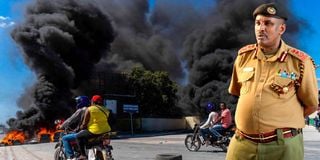
Motorcyclists ride by burning tyres during a police demonstration after a gang attack on a police station which left six officers dead, in Port-au-Prince, Haiti, January 26, 2023. (inset) Deputy Inspector General of Police Noor Gabow.
Kenya has chosen to respond to the current Haitian gang crisis, which threatens the nation's peace and stability, by deploying police officers there.
About 200 gangs operate throughout the Caribbean country, controlling 80 percent of the capital city, Port-au-Prince, and the vast majority of rural areas. Their actions have caused widespread destruction, including loss of livelihoods, displacement of over 360,000 individuals, and massive loss of lives.
In response, the United Nations Security Council (UNSC) passed Resolution 2699 in October 2023, authorising a Multinational Security Support (MSS) mission led by Kenya to assist the Haitian government in restoring law and order. As it is, the mission aims to support the Haitian National Police by protecting critical infrastructure, managing borders and ports, conducting anti-gang operations, and implementing community-oriented policing.
But there have been fears, or even warnings, that this mission faces a tough, risky task ahead. How can Kenya change that narrative?
Kenyan troops
The MSS deployment was to follow the inauguration of Haiti’s Presidential Transition Council on April 25, 2024. So far, the US government has transported civilian contractors to establish a base for the Kenyan troops and the first 200 of an expected 1,000 Kenyan police officers are due to arrive in Haiti anytime this month.
The timeline is positive as the deployment had constantly been delayed due to various factors, including the resignation of former Haiti Prime Minister Ariel Henry on March 11, and legal challenges in Kenya questioning the mission's constitutionality.
Learn from past mistakes
Drawing on historical precedents, current socio-political contexts, and international best practices; these developments underscore the urgent need for specific strategies to ensure the success of the mission.
For a successful mission, the Kenyan-led deployment must draw lessons from previous missions in Haiti. They include the United Nations Stabilisation Mission in Haiti (MINUSTAH), which was established in 2004 and was dissolved in 2017. MINUSTAH faced ethical and criminal accusations including allegations of sexual abuse and a cholera outbreak in 2010 linked to a UN camp, which caused nearly 10,000 deaths and infected over 820,000 people. It also faced allegations of child trafficking. Such incidents have made Haitians sceptical towards any foreign interventions.
Get softer with people
The mission should also avoid heavy-handed tactics by adhering to international laws and protocols governing discipline, use of force, and accountability. Haitian gangs have already threatened to resist the deployment, necessitating restraint and adherence to human rights laws to prevent human rights violations and further violence. Previous interventions in Haiti have often relied on heavy-handed tactics, resulting in human rights abuses, eroded legitimacy, and community distrust. A repeat of this, will make it difficult for security forces to gather intelligence, gain community support, and implement sustainable security measures. Moreover, the use of excessive force can provoke retaliatory violence from gangs and alienate the broader community, exacerbating the conflict.
Get realistic, battle misinformation
Managing public expectations and countering disinformation campaigns are crucial for the mission's success. Negative media coverage and poor public relations will erode public trust, damage the mission's credibility, and foster resistance. The mission has faced constant criticism in both Kenya and Haiti regarding the readiness of deployed officers, citing language and cultural barriers, unfamiliarity with the terrain, and constitutional concerns.
Furthermore, Kenya's persistence in deploying personnel despite court rulings has exacerbated public discontent prompting several court cases challenging the decision to deploy Kenyan police officers in Haiti. The Thirdway Alliance party leader Ekuru Aukot, recently filed an application in the Kenyan courts requesting the government to be held in contempt over its plans to send the first batch of 200 officers to Haiti. The Court is to sit on June 12.
Moreover, Haitian gangs, led by Jimmy Chérizier, also known as “Barbecue”, a former Haitian police officer, have launched a negative campaign to undermine the deployment of Kenya's police force in Haiti. Chérizier has rallied the masses against the deployment, leading to widespread protests. He has driven a narrative portraying gangs as protectors against corrupt politicians. This has drawn scepticism and mistrust among Haitians about Kenya's deployment. This could potentially lead to resistance to the deployment, potentially fuelling more gang violence.
Work with communities
Effective collaboration with local communities and agencies is essential for combating gang violence in Haiti. The MSS must engage with local stakeholders to gain critical intelligence and local and national support. Lack of collaboration will lead to distrust, hinder intelligence gathering, and undermine community-focused security efforts. Perceptions of security forces as outsiders will also provoke backlash and resistance from local communities, undermining the mission's legitimacy and operational effectiveness.
Be flexible, drop what doesn’t work
The Kenyan team also needs to be flexible and avoid rigidly sticking to a pre-conceived plan. They will need to adjust to changing situations on the ground. Gangs may change tactics to enhance their survival and new actors may also emerge. This requires a dynamic approach to the ever-changing security landscape in Haiti.
Kenya police force's involvement in Haiti and the entire MSS mission will require to application of a nuanced approach that prioritises lessons from past missions, avoids heavy-handed tactics, manages public expectations, engages communities and remains adaptable to the ever-changing security situation on the ground to ensure success.
Dr Mwangi is a researcher at Mashariki Research and Policy Centre based in Nairobi









